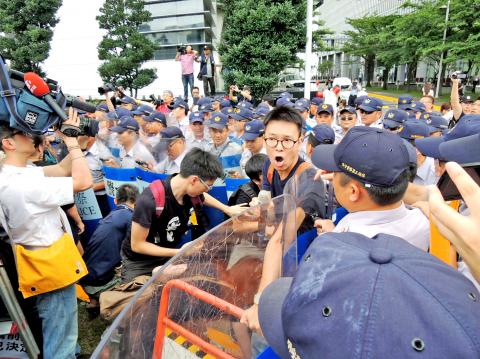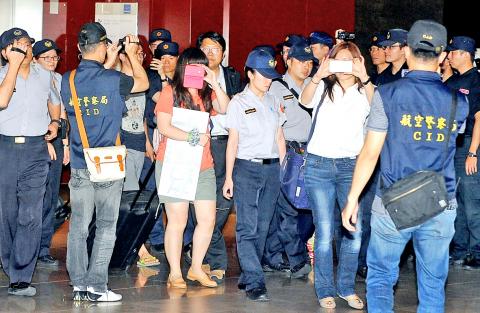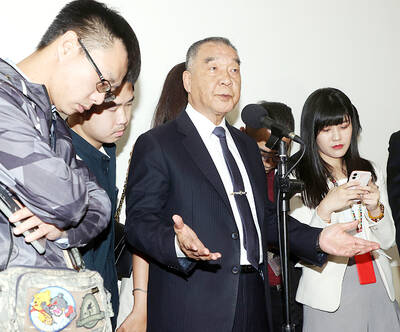Activists yesterday accused the government of abuse of power after a group of “unidentified people” charged into their rooms at the Novotel Hotel in Taiwan Taoyuan International Airport and demanded that they move out before China’s Taiwan Affairs Office Minister Zhang Zhijun (張志軍) was to meet his Taiwanese counterpart, Mainland Affairs Council Minister Wang Yu-chi (王郁琦), at the hotel.
Rights activist and attorney Lai Chung-chiang (賴中強) condemned the government and Novotel over the hotel’s treatment of him as a guest.
“Because of the meeting between Wang and Zhang, we were deprived of our freedom for more than 10 hours,” Lai told the crowd after he was released by the police a little after 7pm. “How many more of our human rights and freedoms should be sacrificed for Zhang? Or to make Beijing happy?”

Photo: Chou Min-hung, Taipei Times
“I have booked the rooms through the regular reservation system and paid for the rooms, so, legally, they are the same as a private home during the period. The police and the hotel staff had no right to do what they did,” he said.
Lai said he booked two rooms for two nights and checked into the hotel on Tuesday night.
However, police and hotel staff knocked on his door at about 9am yesterday, asking them to vacate the rooms, saying there might be “security concerns.”

Photo: Chu Pei-hsiung, Taipei Times
They returned later and forcibly broke into the rooms, saying that since there is only person registered for each room, all other people must leave.
“That doesn’t make sense at all. Isn’t it common practice around the world that only one person needs to register his or her name for a room?” Lai said. “Therefore we refused to leave.”
Another person in the room, Chien Nien-yu (簡年祐), said that the police and hotel staff pretended it was room service the first time they knocked on the door.
Lai said he and six other members of Democracy Tautin were planning to hang protest banners from the windows of their hotel rooms when Zhang arrived, “but we didn’t mean to interrupt the meeting, and it’s our freedom or expression to do what we planned to do as long as we don’t bother people.”
Since the hotel staff and the police failed to have them vacate the rooms before Zhang’s arrival, more than a dozen police officers stood guard outside the rooms, prohibiting them from leaving when the meeting started.
By telephone, the Taipei Times overheard the conversation between Lai and the hotel staff.
When Lai asked if they could leave at 6:15pm, the staff member said: “You have to wait until a little later to leave.”
When Lai turned to a police officer, saying he would like to file a lawsuit of breach of freedom of movement, the officer said Lai must follow him to another place to make the report.
The seven in the room were forced into police cars at 6:57pm. They were released and greeted by a crowd of protesters outside at 7:05pm.
Hours after the incident and with the picture of a broken door latch and the video of hotel staff breaking into the hotel rooms going viral on the Internet, 13 civic groups jointly organized a press conference condemning the state intrusion.
A hotel room booked by a customer is tantamount to the personal residence, said Greg Yo (尤伯祥), a lawyer and member of the Judicial Reform Foundation.
“My house is my castle. This is a principle of freedom and safety of residence that has been finally established after years of authoritarian rule in Taiwan. However, this line has been crossed by the government’s action this morning. What the government is telling the public by its action is that it has no concern whatsoever for such a red line... Then [its] next step would be taking people away on the street without justification,” Yo said.
Foundation executive director Kao Jung-chih (高榮志) attributed the police’s abuse of power to the prosecutors’ connivance, the court’s negligence and the failure of judicial authorities to take on the responsibility of checks and balances.
In response to the complaints, the police said it was hotel staff who broke into the rooms of the guests and that the police happened to be at the site and filmed the whole process.
The National Security Bureau also denied in a press release that its agents were involved in the “break-in” incident, saying the bureau was only in charge of the security of designated individuals.
Additional reporting by Alison Hsiao, Chris Wang and CNA

ROLLER-COASTER RIDE: More than five earthquakes ranging from magnitude 4.4 to 5.5 on the Richter scale shook eastern Taiwan in rapid succession yesterday afternoon Back-to-back weather fronts are forecast to hit Taiwan this week, resulting in rain across the nation in the coming days, the Central Weather Administration said yesterday, as it also warned residents in mountainous regions to be wary of landslides and rockfalls. As the first front approached, sporadic rainfall began in central and northern parts of Taiwan yesterday, the agency said, adding that rain is forecast to intensify in those regions today, while brief showers would also affect other parts of the nation. A second weather system is forecast to arrive on Thursday, bringing additional rain to the whole nation until Sunday, it

LANDSLIDES POSSIBLE: The agency advised the public to avoid visiting mountainous regions due to more expected aftershocks and rainfall from a series of weather fronts A series of earthquakes over the past few days were likely aftershocks of the April 3 earthquake in Hualien County, with further aftershocks to be expected for up to a year, the Central Weather Administration (CWA) said yesterday. Based on the nation’s experience after the quake on Sept. 21, 1999, more aftershocks are possible over the next six months to a year, the agency said. A total of 103 earthquakes of magnitude 4 on the local magnitude scale or higher hit Hualien County from 5:08pm on Monday to 10:27am yesterday, with 27 of them exceeding magnitude 5. They included two, of magnitude

The navy next month is expected to commission into service two more domestically built Tuo Chiang-class stealth missile corvettes, a source said yesterday. The Hsu Chiang (旭江, PGG-621) and the Wu Chiang (武江, PGG-623) would be officially commissioned in a ceremony early next month, the source said, speaking on condition of anonymity. The corvettes, launched in February and June last year respectively, were delivered to the navy in February. They are the third and fourth Tuo Chiang-class stealth missile corvettes to be produced. The Tuo Chiang-class corvette is a domestically designed and manufactured class of fast and stealthy multipurpose corvette built for the

A total of 41 US military personnel were stationed in Taiwan as of December last year, a US congressional report said on Friday last week ahead of Tuesday’s passage of an aid package that included US$8 billion for Taiwan. The Congressional Research Service in a report titled Taiwan Defense Issues for Congress said that according to the US Department of Defense’s Defense Manpower Data Center, 41 US military personnel were assigned for duty in Taiwan. Although the normalization of relations with the People’s Republic of China (PRC) in 1979 included a vow to withdraw a military presence from Taiwan, “observers have indicated